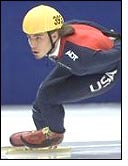 "I'm going to show you body wisdom," the old man said. "Everything you'll ever need to know is within you; the secrets of the universe are imprinted on the cells of your body. But you haven't learned inner vision; you don't know how to read the body. Your only recourse has been to read books and listen to experts and hope they are right. When you learn body wisdom, you'll be a Teacher among teachers."
"I'm going to show you body wisdom," the old man said. "Everything you'll ever need to know is within you; the secrets of the universe are imprinted on the cells of your body. But you haven't learned inner vision; you don't know how to read the body. Your only recourse has been to read books and listen to experts and hope they are right. When you learn body wisdom, you'll be a Teacher among teachers."That scene occurs early on in Dan Millman's "Way of the Peaceful Warrior," a self-help book based on the story of the author and a man named Socrates, who becomes his mentor. A cult classic two decades ago, "Way of the Peaceful Warrior" is Apolo Anton Ohno's favorite book and goes a long way toward explaining his Olympic quest.
Entering this year's Winter Olympiad at Salt Lake City, Ohno ranks as one of the U.S.'s top medal candidates. He dominated last year's short-track speed skating season--the winner in the 500 meters, 1,000 meters, 1,500 meters, 3,000 meters and the overall championship. Ohno became enthralled with speed skating at the age of 12 when he saw the short-track finals from Lillehammer, Norway, site of the '94 Games. He promptly tore apart his in-line skates and tried to fit them with blades.
At the age of 14, his father, Yuki, shipped him off to train at Lake Placid, a training site for the U.S. short-track team. The move almost backfired as Ohno, a native of Seattle, felt homesick and "caged" by the small town atmosphere. But soon he began to pour his energy into learning to win at short track. It's a pell-mell event where competitors fly around the rink at 30 miles per hour in packs of five. Miss an edge or get nudged off-balance? Too bad, before you know it you'll be sliding into the sideboards. Your medal chances over.
When Ohno talks about his sport, one can hear echoes of Millman's body wisdom.
"I just feel the ice," Ohno says. "I can feel it under my feet. I can feel it under my toes. I feel every ripple in the ice and I feel that's something that contributes a lot to my success.
Relatively new to the Olympics, short-track speedskating emphasizes strategy. The more traditional long track, in which American Eric Heiden won five gold medals in 1980, stresses speed and competing against the clock.
"I'm half-Japanese and my dad is pretty short; I'm pretty short," says Ohno, who is 5' 8 ", 165 pounds. "You look at long track, those guys are just enormous. I don't think it's so much about my build, it's more (that) I have the talent on the ice."
If Ohno brings home gold, he plans on giving his first medal to his father, Yuki Ohno, who runs a hair salon back in Seattle.
"He has been a tremendous influences in my life," Ohno once said in an on-line interview with the U.S. Speedskating Federation. "He's strict, but he's always there to support me. I think I get my work ethic from him."
Not that 19-year-old's emergence as a gold-medal contender has been without growing pains. Four years ago, before the Nagano Games, he failed to even make the U.S. team. Ohno blames a lousy attitude and being in poor shape. Since then he has changed his diet, training routine, and his mental preparation for competition. Not only has he embraced the ways of the peaceful warrior, he meditates regularly and employs mental imagery. A television in his apartment is often cued to a recent tape of a race or practice.
"Watching myself allows me to improve my performance a lot quicker," Ohno says. "Right now I have to work on my technique and improve my focus. I have to be more consistent with my arm swing. This is the hard part of short track--the constant focus on technique and mental attitude toward skating. It's what I live for."

